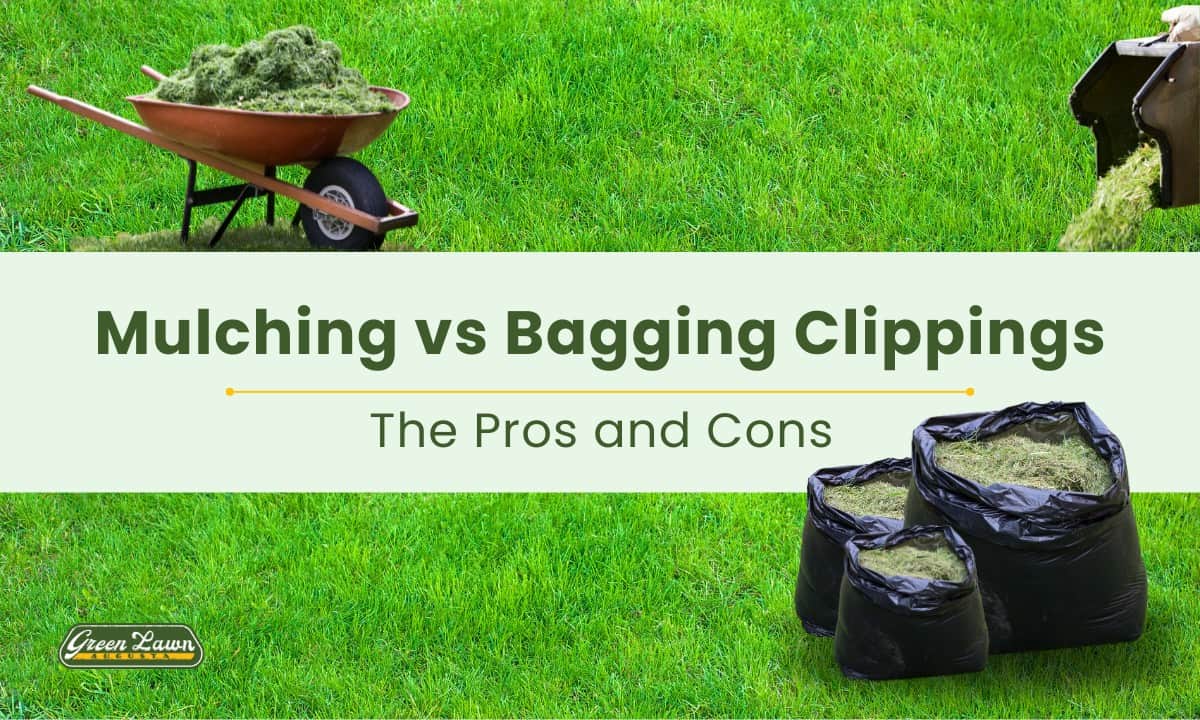Tired of dealing with lawn clippings? The question is – should you mulch or bag? Each method has its pros and cons.
Benefits of Mulching Clippings
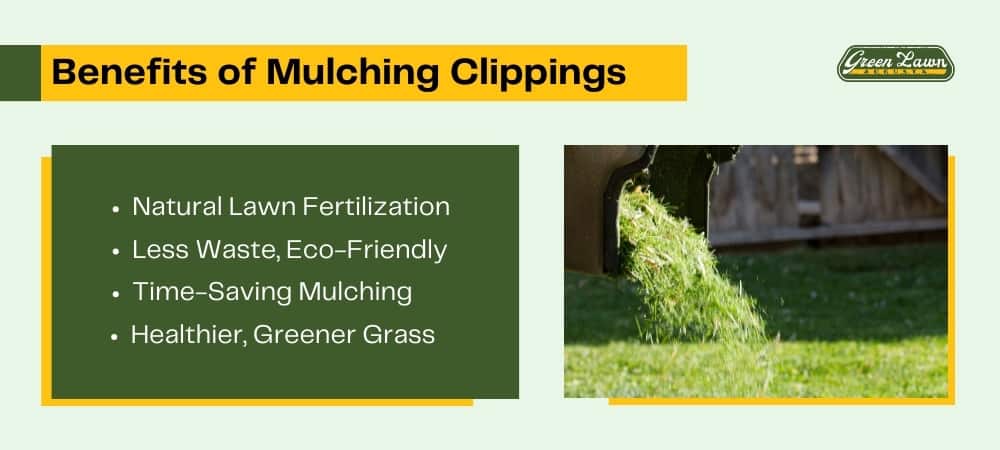
Mulching grass clippings improves lawn health and saves time.
It’s a simple tactic to reduce yard waste and lessen landfill contributions. At the same time, it offers a natural way to fertilize your grass.
Let’s delve into the myriad of advantages this approach can bring to your lawn care routine.
Natural Fertilizer for the Lawn
Using grass clippings as mulch replenishes soil with nutrients, debunking lawn care myths.
Mulching is like composting, creating a rich environment for growth. It’s a green alternative to artificial fertilizers, reducing reliance on chemicals.
If mulching isn’t practical, other lawn-friendly options exist. The right knowledge helps you choose what’s best for creating a vibrant, green outdoor haven.
Reduces Yard Waste and Landfill Contributions
Mulching grass clippings reduces yard waste and benefits the environment.
However, you can practice waste-free lawn care by composting yard waste to create nutrient-filled compost for your garden.
Saves Time Not Bagging Clippings
Mulching instead of bagging lawn clippings saves time and boosts lawn health. No more heavy bags to lug around after mowing.
Clippings become natural fertilizer, enriching the soil with nutrients and reducing the need for watering and fertilizing.
It’s a win-win. Your lawn gets to look its greenest and most vibrant, and you get to chill out more often.
Promotes Healthier, Greener Grass
If you want a practical and efficient lawn care strategy, mulching your clippings is the answer. Not only does it save time and energy, but it also enhances your lawn’s health and appearance.
The added organic matter aids in preserving water, keeping your turf vibrant. Plus, it bolsters soil microbiology, leading to a lush, green lawn.
In short, mulching isn’t just about lesser work. It’s about investing in a stunning low-maintenance lawns for the aesthetic of your home – a sensible choice for any Augusta homeowner.
Downsides of Mulching Lawn Clippings
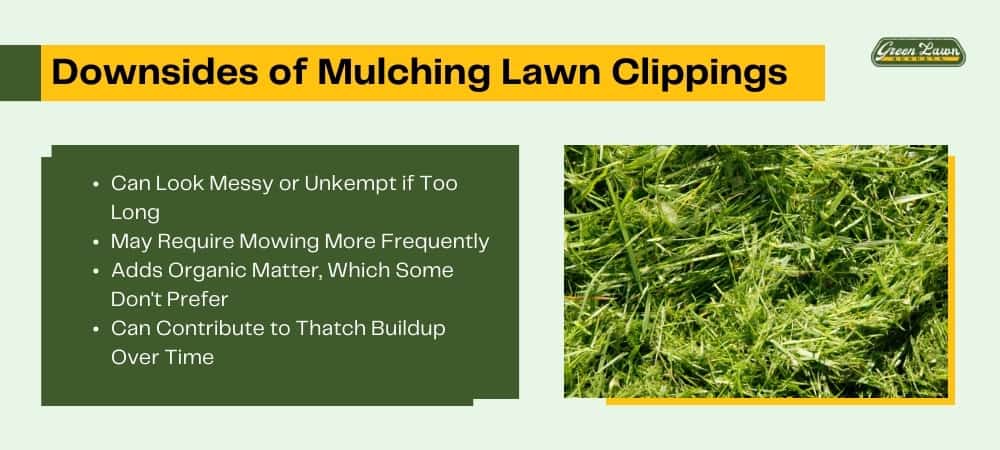
While mulching your lawn clippings has its benefits, it also has drawbacks.
For instance, if you let the clippings overgrow, your lawn might appear untidy. You might need to mow more often to maintain a neat look.
Additionally, you may face a gradual buildup of undesirable organic material or thatch over time.
Can Look Messy or Unkempt if Too Long
Long grass clippings can make your lawn look disheveled and harm the grass.
That said, mulching enriches the soil with organic matter, but watch out for thatch accumulation that can harm your lawn.
To maintain a neat lawn, regularly mow it, sharpen blades, and use a mulching mower to chop clippings finely.
With a touch of extra diligence, you can enjoy the advantages of mulching while keeping your lawn spick and span.
May Require Mowing More Frequently
The art and science of lawn mowing, might mean you’ll be cutting your grass more often. But think of it this way – that’s just a sign that your grass is growing faster, healthier, and part of the upkeep.
Mulching has numerous benefits, like a healthy green lawn that can withstand harsh conditions. With useful lawn care tools available, managing your lawn’s health has become simpler than ever.
Adds Organic Matter, Which Some Don’t Prefer
Although mulching can give your lawn a lush, green appearance, not everyone may appreciate the additional organic matter it introduces. While it has the benefit of enhancing soil fertility, it can also result in certain drawbacks.
Thatch buildup can obstruct water and nutrient flow to roots, causing issues like frequent mowing and changes in soil composition.
Over time, this surplus organic material can disrupt your soil’s equilibrium, leading to potential issues for specific grass varieties.
Can Contribute to Thatch Buildup Over Time
Mulching lawn clippings can lead to thatch buildup, which harms your lawn’s health. Regular aeration and scarification are essential to combat this.
Still, don’t dismiss the positives of keeping clippings on the lawn, as they can enrich the soil and foster healthier grass. If mulching causes issues, consider alternatives like composting to recycle clippings and boost soil fertility.
It’s a balancing act – while mulching has its pros, too much can lead to thatch buildup. Always closely monitor your lawn’s health and tweak your care methods as needed.
Pros of Bagging Lawn Clippings
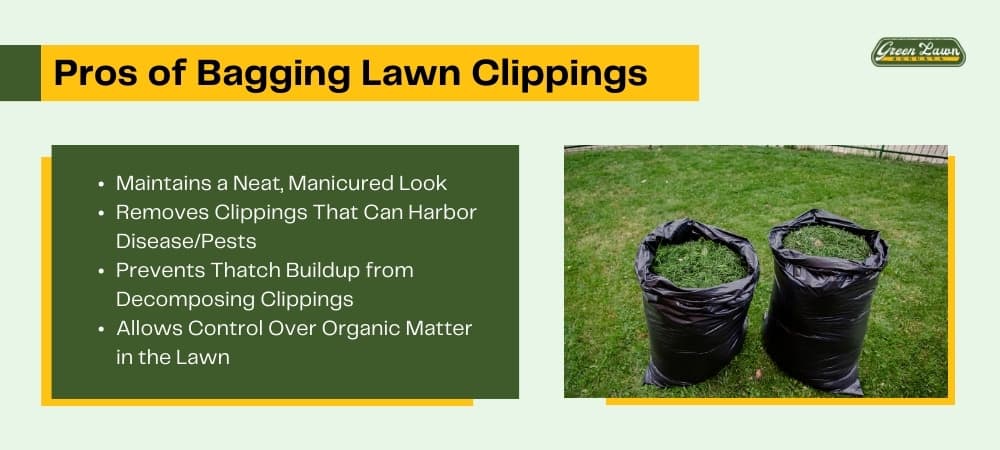
Bagging your grass cuttings comes with its own set of perks.
Not only does it keep your yard looking well-kept and clean, but it also acts as a preventive measure against diseases and pests.
Plus, it enables you to manage the organic composition of your lawn by avoiding thatch accumulation from rotting cuttings.
Maintains a Neat, Manicured Look
If you prefer a pristine yard, bagging your lawn clippings might be the way to go, despite the benefits of mulching.
Bagging grass clippings reduce mowing frequency, control pests and diseases, and prevent thatch buildup. Though it removes some nutrients, it promotes a clean and uniform lawn appearance.
Removes Clippings That Can Harbor Disease/Pests
Bagging lawn clippings is crucial in controlling pests and diseases. It eliminates potential breeding grounds for pests and fungus, resulting in a healthier, more attractive lawn.
Consider pest control and disease prevention when deciding to mulch or bag, but remember, bagging is more work and may not be necessary for a healthy lawn. Your decision should balance your lawn’s needs, eco-friendliness, and aesthetics.
Prevents Thatch Buildup from Decomposing Clippings
Remember, bagging your lawn clippings not only maintains a tidy appearance and manages pests but also prevents thatch buildup from decomposed clippings.
This method eliminates thatch for a healthier lawn with less upkeep. Less organic matter means less buildup and more vitality.
Plus, eliminating potential pest and disease habitats will make your lawn healthier.
Allows Control Over Organic Matter in the Lawn
Bagging your lawn clippings gives better control over the soil’s organic content. If you want less fertile soil, bagging is a good option. Mulching can saturate your lawn with organic material.
Mulching benefits soil health but can cause thatch buildup. Proper organic material management is crucial. Bagging clippings help maintain balance, preventing lawn overload & promoting soil health.
The best approach hinges on your lawn’s specific requirements.
Cons of Bagging Lawn Clippings
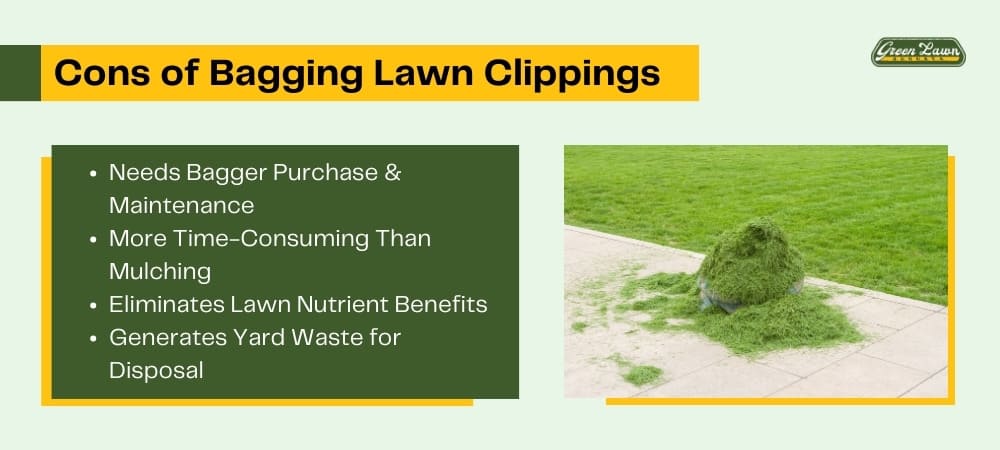
Bagging lawn clippings isn’t always necessary, as it requires a bagger and is slower than mulching.
Plus, you’ll miss out on the nutrients mulching can offer your grass. Also, you’re left with the issue of correctly eliminating garden waste.
Requires Purchase and Maintenance of Bagger
Bagging grass is pricey and time-consuming. Baggers are expensive, need regular cleaning and repairs, and require additional costs for bag replacement.
Meanwhile, consider mulching as a smarter, more affordable, and less labor-intensive lawn care alternative that naturally nourishes your lawn.
More Time Consuming Than Mulching
Bagging lawn clippings is time-consuming, interrupting the mowing flow and prolonging outdoor tasks.
Mulching is a great alternative. It saves time and promotes lawn health by spreading cut grass as a natural fertilizer. This enhances soil fertility and controls organic matter.
Eliminates Nutrient Benefits for the Lawn
Mulching is better than bagging your grass clippings. Bagging strips away vital nutrients that could be reintroduced to the soil through mulching. Mulching helps improve soil health and nutrient absorption in the long run.
It also worsens environmental issues by adding to yard waste that ends up in landfills. More so, it could cause soil compaction and erosion over time.
To achieve a truly healthy lawn, prioritize soil health and consider mulching over bagging for optimal results.
This way, you’ll have a lush green lawn and a sustainable and nutrient-filled environment for your grass to thrive.
Creates Yard Waste Requiring Disposal
When you dispose of your lawn clippings in the garbage, you contribute to landfill waste, negatively impacting the environment and soil health.
Instead, why not think about composting? It’s a greener way to dispose of yard waste and can improve your lawn’s quality.
Plus, it helps to reduce landfill waste, save water, and lower greenhouse gas emissions.
And here’s the best part – composting could save you some cash. You won’t need to buy bags or pay for waste disposal; you only need your lawn waste and a little bit of your time.
It’s a smart, cost-efficient, and environmentally friendly option.
Key Tips for Success
If you want a lush, healthy lawn, using smart techniques is essential beyond aesthetics.
Here’s how to get started:
First, ensure to water your lawn deeply but sparingly in the morning for strong root growth.
Secondly, choose the right grass type for your soil and climate with help from a local nursery. Consider your lawn’s seasonal needs for optimal growth.
Regular soil testing is another important step to keep the right pH and nutrient balance.
Finally, use green pest control methods to safeguard your lawn.
For comprehensive lawn care solutions tailored to Augusta’s unique climate, explore Green Lawn Augusta’s professional Augusta lawn care. Our team is dedicated to keeping your lawn healthy and vibrant year-round.”

